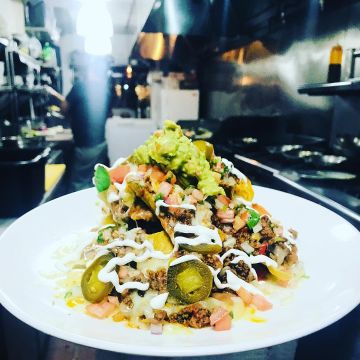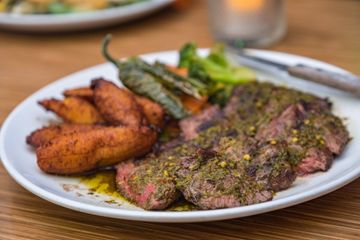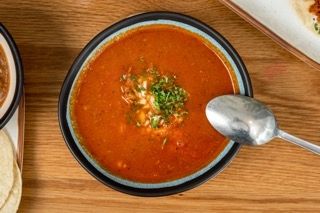Is Mexican Food Healthy And Balanced? Unloading the Nutritional Benefits of Standard Ingredients
The inquiry of whether Mexican food is healthy welcomes an expedition of its standard ingredients. Beans and corn offer as foundational staples, rich in healthy protein and fiber. Avocados offer helpful fats, while different natural herbs and spices include flavor and health and wellness advantages - New York Times rated. With each other, these elements develop a tapestry of nutrition. The healthiness of Mexican food often depends on preparation approaches and section sizes. What duty do these factors play in identifying its total nutritional worth?
The Power of Beans: Healthy Protein and Fiber-Rich Staples
Frequently overlooked, beans offer as a cornerstone of Mexican food, offering a riches of dietary benefits. Rich in healthy protein, they are an outstanding plant-based choice for those seeking to meet their nutritional healthy protein requires. This high healthy protein content supports muscle repair work and growth, making beans very useful for both vegetarians and meat-eaters alike. Additionally, beans are an outstanding resource of nutritional fiber, which helps in digestion and promotes a feeling of fullness, possibly assisting with weight administration.
The selection of beans utilized in Mexican meals, such as black beans, pinto beans, and kidney beans, contributes to a diverse taste profile and can improve dishes nutritionally. Beans are low in fat and include important vitamins and minerals, consisting of iron, folate, and magnesium. Together, these attributes make beans a critical active ingredient, providing both nutrition and sustenance in traditional Mexican price.

Corn: a Versatile Grain With Nutritional Perks
Corn stands out as a functional grain fundamental to Mexican food, commemorated not only for its cooking applications yet likewise for its impressive nutritional account. As a primary component in recipes like tortillas, tamales, and pozole, corn provides necessary nutrients that add to a well balanced diet regimen. Rich in carbs, it works as a substantial power source, while additionally being low in fat, making it a positive option for various dietary requirements.
Corn is a great resource of dietary fiber, which assists in digestion and advertises satiation. It includes substantial amounts of vitamins such as B-complex vitamins, which are crucial for basal metabolism. The existence of anti-oxidants, particularly carotenoids, contributes to total health and wellness by lowering oxidative stress and anxiety. Furthermore, corn is gluten-free, satisfying those with gluten level of sensitivities. Generally, the dietary advantages of corn emphasize its importance in traditional Mexican food and its role in a healthy diet.
Avocados: Healthy And Balanced Fats and Nutrients in Every Bite
Avocados play a substantial role in Mexican cuisine, enhancing recipes with their luscious structure and abundant taste. Past their cooking allure, avocados are commemorated for their remarkable dietary account. They are a rich source of healthy and balanced monounsaturated fats, which can aid lower bad cholesterol levels and support heart health and wellness. Furthermore, avocados are packed with vital minerals and vitamins, including potassium, vitamin E, and B vitamins, adding to total health.
The high fiber web content in avocados help digestion and promotes satiation, making them a valuable enhancement to any type of dish. Their one-of-a-kind nutrient structure can likewise support skin health and offer anti-inflammatory benefits. Integrating avocados into traditional Mexican recipes or appreciating them as a standalone snack can boost both flavor and nutrition, showing why they are a cherished staple in Mexican cuisine. On the whole, avocados use a tasty way to appreciate healthy fats and crucial nutrients in every bite.

Herbs and seasonings: Flavorful Health And Wellness Boosters
While delighting in the abundant flavors of Mexican food, one can not neglect the essential duty that spices and herbs play in boosting both taste and wellness. Ingredients such as oregano, cilantro, and chili peppers not just add to the dynamic taste account yet also offer considerable wellness advantages. As an example, cilantro is known for its purifying properties, helping to get rid of heavy metals from the body, while oregano is loaded with antioxidants and possesses anti-inflammatory results.
Chili peppers, a staple in many Mexican recipes, contain capsaicin, which has actually been linked read this article to improved metabolism and discomfort alleviation. Furthermore, flavors like cumin and coriander assistance food digestion and might help in blood sugar level regulation. Incorporating these tasty health and wellness boosters right into dishes not only enhances the cooking experience yet likewise promotes general wellness, making Mexican cuisine not just delicious, yet likewise nutritionally helpful.
Standard Food Preparation Approaches: Enhancing Nourishment and Flavor
Traditional food preparation techniques in Mexican cuisine play a vital role in improving both nourishment and flavor, as they typically prioritize fresh components and time-honored techniques. Methods such as nixtamalization, where corn is soaked and click for more info prepared in an alkaline option, not only boost the nutrient account of tortillas however also improve their digestibility - take out and delivery. Furthermore, using slow-moving cooking techniques, like cooking or braising, enables tastes to blend magnificently while retaining the honesty of the components

Often Asked Concerns
Are Mexican Food Portions Typically Larger Than Other Foods?
Mexican food sections are commonly larger than those of many various other foods. This characteristic mirrors standard dining practices, stressing common sharing and hearty meals, which can bring about a much more substantial serving dimension generally.
Exactly how Does the Prep Work Technique Affect Healthiness of Mexican Food?
Prep work methods greatly influence the healthfulness of Mexican food. Techniques such as cooking or steaming blog here protect nutrients, while frying can increase undesirable fat content. Selections of components and cooking designs ultimately identify overall dietary value.
Can Mexican Food Be Customized for Certain Dietary Constraints?
Mexican food can undoubtedly be customized for particular nutritional restrictions. Replacements, such as using corn tortillas for gluten-free diet plans or including more veggies, enable individuals to appreciate conventional tastes while fitting numerous nutritional requirements.
What Prevail Misconceptions Regarding Mexican Food and Wellness?
Common mistaken beliefs regarding Mexican food consist of the belief that it is naturally unhealthy, excessively spicy, and exclusively concentrated on fats. In reality, traditional meals usually feature healthy ingredients and can be tailored to different nutritional needs.
Exist Much Healthier Alternatives at Mexican Restaurants?
Healthier choices at Mexican dining establishments typically consist of grilled meats, beans, and fresh vegetables. Choosing meals that highlight entire active ingredients and avoiding heavy sauces can result in an extra nourishing dining experience, promoting general health.
The selection of beans utilized in Mexican meals, such as black beans, pinto beans, and kidney beans, adds to a diverse taste profile and can boost dishes nutritionally. Avocados play a significant function in Mexican cuisine, enhancing meals with their velvety structure and abundant flavor. Integrating avocados into conventional Mexican dishes or enjoying them as a standalone snack can boost both taste and nourishment, demonstrating why they are a cherished staple in Mexican cuisine. While delighting in the rich tastes of Mexican food, one can not ignore the necessary function that spices and herbs play in enhancing both taste and wellness. Typical food preparation techniques in Mexican cuisine play an essential duty in boosting both nourishment and flavor, as they typically prioritize time-honored methods and fresh ingredients.